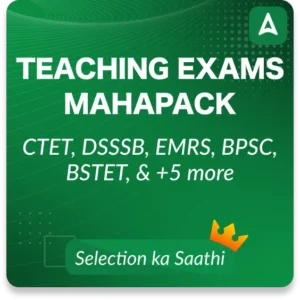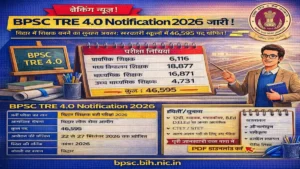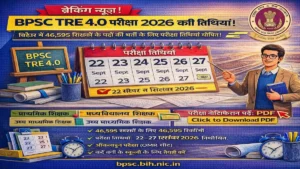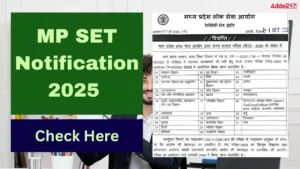Table of Contents
The Kendriya Vidyalaya Sangathan (KVS) Recruitment 2025 has been announced to fill 9,921 teaching and non-teaching vacancies across KVS schools, making it a major opportunity for aspiring candidates. Applicants targeting PRT, TGT, and PGT posts must clearly understand the KVS Selection Process 2025, as it plays a key role in final selection. The recruitment process involves multiple stages designed to evaluate candidates’ subject knowledge, teaching ability, and overall aptitude. Having a clear idea of each stage helps candidates prepare strategically, avoid confusion during the process, and improve their chances of securing a position in Kendriya Vidyalayas.
KVS Selection Process 2025: Overview
The KVS Selection Process 2025 follows a clearly defined multi-tier system that varies according to the post applied for, ensuring a fair and comprehensive evaluation of candidates. For teaching posts such as PRT, TGT, and PGT, the final merit list is prepared by combining performance in Tier-2 and the Interview or Demo Teaching round, with 85 percent weightage given to Tier-2 marks and 15 percent to the Interview. This structure helps assess both subject knowledge and teaching ability in a balanced manner. For certain non-teaching posts like Stenographer and Junior Secretariat Assistant, a Skill Test is also mandatory, and candidates must qualify it to be considered for final selection. Understanding this post-wise selection process is essential for candidates preparing for KVS Recruitment 2025, as it allows them to focus their preparation on the stages that directly impact their final merit.
- Tier-1 (Preliminary/Screening Exam)
- Tier-2 (Subject Knowledge & Descriptive Test)
- Interview / Demo Teaching (where applicable)
- KVS NVS Exam Analysis 2026 Out – Click to Check
- KVS NVS Answer Key 2026 Out – Click to Download
- KVS NVS Question Paper 2026 Out – Click to Download
- KVS NVS Admit Card 2026 – Click to Download
KVS Tier-1: Preliminary Examination
- Mode: Objective (OMR-based)
- Duration: 2 hours
- Total Marks: 300
- Negative Marking: 1 mark deducted per wrong answer.
- Shortlisting: Candidates are shortlisted for Tier-2 in a 1:10 ratio relative to notified vacancies.
- Tier-1 acts as a screening test. It is bilingual (English + selected Indian language), and candidates cannot change the language choice after submission.
- Exam Pattern:
| KVS Tier-1 Paper Structure | ||
| Test Components | NO. of Questions | Total Marks |
| Part I- General Reasoning | 20 | 60 |
| Part II- Numeric Ability | 20 | 60 |
| Part III – Basic Computer Literacy | 20 | 60 |
| Part V – Language Competency (English) | 10 | 30 |
| Part VI – Language Competency (Modern Indian Language) | 10 | 30 |
| Total | 100 | 300 |
KVS Tier-2: Subject Knowledge Test
- Mode: Combination of Pen-Paper & OMR-based
- Duration: 2½ hours
- Total Marks: 100 (60 objective + 40 descriptive)
- Medium: Hindi & English (except language-specific posts, tested in concerned language)
- Negative Marking: 0.25 per wrong answer for objective questions
- Candidates are shortlisted for Interview or Skill Test based on Tier-2 scores, in ratios of 1:3 (Interview) and 1:5 (Skill Test).
- Tier-2 tests candidates’ post-specific knowledge:
- PGT: Post-graduation level
- TGT & Administrative roles: Graduation level
- PRT & Junior Secretariat Assistant: Senior Secondary level
- Multi-Tasking Staff: Secondary level
- Exam Pattern:
| KVS Tier-2 Structure | |||
| Components of Test | Type | No. of Questions | Total Marks |
| Subject knowledge | Objective | 60 | 60 |
| Subject knowledge | Descriptive | 10 | 40 |
| Total | 70 | 100 | |
KVS Interview / Demo Teaching
For teaching posts under KVS Recruitment 2025, including PGT, TGT, and PRT, the Interview or Demo Teaching stage plays a crucial role in the final selection process, as it assesses a candidate’s subject knowledge, teaching methodology, classroom management skills, communication ability, and overall suitability for the role of a teacher. This stage focuses on how well aspirants can explain concepts, engage students, and apply pedagogical principles in a real classroom setting. In contrast, candidates applying for non-teaching posts such as Assistant Section Officer or Lab Attendant are not required to appear for an interview, and their final merit is prepared solely based on Tier-2 examination scores, as per the official KVS selection norms.
- Teaching methodology and classroom interaction
- Communication and subject knowledge
- Overall aptitude and leadership skills
- Weightage: 15% of final merit
- Marks: 100 (for interviews, scored proportionally)
KVS Skill Test (Where Applicable)
For posts that involve skill-based assessment, such as Stenographer and Junior Secretariat Assistant, candidates are required to appear for qualifying skill tests that include typing, shorthand, and computer proficiency. These tests are mandatory and act as an eligibility stage, meaning candidates must clear them to be considered for inclusion in the final merit list. As per the prescribed norms, a minimum of 40 percent marks is required in the Computer Proficiency Test (CPT). Only those who successfully meet the skill test criteria will move forward in the selection process, making this stage crucial for candidates applying to skill-oriented non-teaching positions under the recruitment drive.
KVS and NVS Allocation Process
The KVS and NVS Allocation Process for the Selected Applicants will depend on the preference added to the application during form form-filling process. Read the following more details.
- After final merit is prepared, candidates must submit post preferences online.
- Allocation is based on merit and preference, with only one post allotted per candidate.
- Candidates who do not submit preferences within the notified period will not be considered.
- Posting will be done by KVS/NVS, and no waiting list is maintained.
Key Points to Remember for KVS Aspirants
- Tier-1 & Tier-2 admit cards and exam city details are available only through candidate login.
- Examination cities are allotted randomly based on applicant numbers.
- No re-evaluation requests are entertained for any stage.
- Candidates must regularly check CBSE, KVS, and NVS websites for updates.
- This updated KVS Selection Process 2025 ensures transparent evaluation, balancing knowledge, teaching skills, and practical aptitude to select the most qualified candidates for PRT, TGT, and PGT posts.
Tips for the KVS Demo teaching session:
The demo teaching session is an important part of the KVS selection process. Here are some tips on how to perform well in the demo teaching session:
- Choose a topic that you are confident in: Choose a topic for your demo teaching session that you are confident in and that you can teach effectively.
- Prepare a lesson plan: Prepare a detailed lesson plan for your demo teaching session. The lesson plan should include the learning objectives, activities, and assessment methods.
- Practice your lesson: Practice your demo teaching session thoroughly before the day of the exam. This will help you deliver your lesson smoothly and confidently.
- Be interactive: Engage with the students during your demo teaching session. Ask them questions and encourage them to participate.
- Be enthusiastic: Show your enthusiasm for teaching during your demo teaching session. This will help you make a good impression on the judges.
Preparation Tips for KVS Interview
1. Dress up yourself properly – The first impression is the last impression. Your body language plays a significant role during the interview. Dressing is the most important part of the interview because it reflects your personality.
- For Males – A shirt and Trousers with a Tie (optional) will be the best way to present yourself.
- For Females – A female can go with a saree and suits salwar which will give a good impression to the panel
2. Be Punctual – Reach your interview centre before the given time so that you can relax and avoid rushing until the last minute. It will also boost your confidence & give a positive outlook to the interviewee.
3. Be Confident – Confidence is the key to cracking or handling any situation. Confidence in your personality shows by your gestures and your facial expressions. Do not show that you are nervous.
4 Learn To Accept- “NO”-It is possible that you may not know the answer to a few questions. So don’t be nervous about it. You can make a smart move or accept that you don’t recall the answer at that time or you don’t know the answer but you will definitely read about it.
5. Revise Commonly Asked Questions: Always pay attention to the questions that an interviewer mostly asked in all interviews. Instead of giving the same replies make your own answer, as it will be more impressive for him/her. Giving your answers with confidence is the main element of the situation.
6. Prepare yourself to give the answer about your home town, and be prepared for the question which might be asked by the interviewer about your native place like “What is your hometown famous for?” or “Name the famous personality who hails from the city you belong to? As well there might be some possibility that they may ask questions related to where you want to join and tell me about your preference.
7. Just Be Yourself – Lastly, the most important tip is that ‘Just Be Yourself’. Do not try to copy another person.
All the best aspirants. You have made this journey so far, just one step more and your dream job is just there. Keep practising with Adda247.




 BPSC TRE 4.0 Vacancy 2026 Announced, Not...
BPSC TRE 4.0 Vacancy 2026 Announced, Not...
 BPSC TRE 4.0 Exam Date 2026 Out, Check S...
BPSC TRE 4.0 Exam Date 2026 Out, Check S...
 MP SET Exam Date 2026 Reschedule, Check ...
MP SET Exam Date 2026 Reschedule, Check ...













